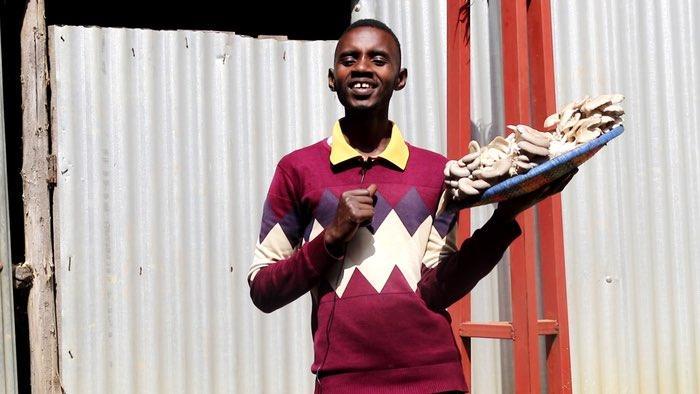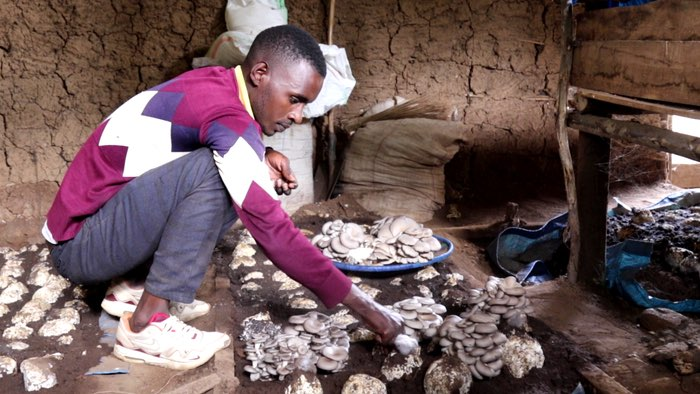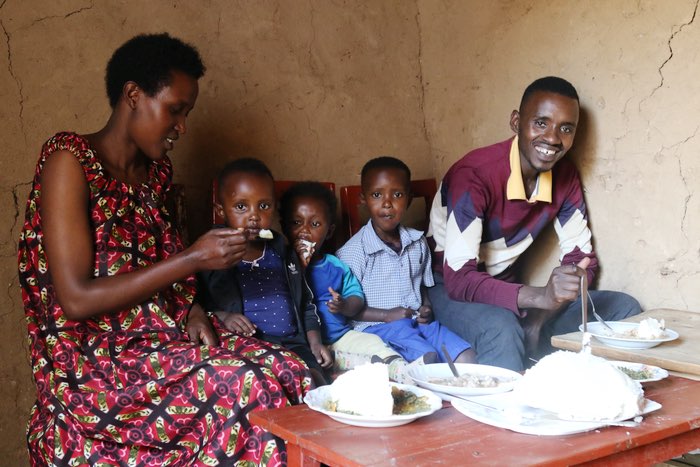
Amos Anias poses for a photo with a basket of mushroom harvested from his garden inside Kigeme camp. Photo: WFP/JohnPaul Sesonga
It is around 8:00 AM, and the sun softly casts its rays through the clear blue sky of Nyamagabe district in southern Rwanda. Here lies the Kigeme refugee camp, stretched across two hills separated by the road connecting Huye and Nyungwe National Park. Established in 2012, this camp hosts over 14,000 Congolese refugees, mainly from the eastern regions of Masisi and Rutshuru, which have been significantly affected by protracted armed conflict.
Inside the camp, I meet Amos Anias, a 32-year-old Congolese refugee. He greets me with a smile as I ask him about World Refugee Day. “I know the World Refugee Day; it’s our day to celebrate and get more recognition,” he says. “However, it is also a day for the entire international community to recognize the value of peace, join hands for peace, and support efforts to bring peace to my country, the DR Congo, so that my fellow refugees and I can go back home soon,” he adds.
Rwanda hosts over 135,000 refugees and asylum seekers in five permanent camps which include Kigeme, and the Nkamira transit centre. Sixty-one percent of these refugees are from eastern DR Congo, a region plagued by prolonged armed conflict. Most of these Congolese refugees have been in camps for over two decades with little hope of returning home soon. Limited land for cultivation and income-generating opportunities mean that 90 percent of these refugees are classified as highly vulnerable, while 5 percent are moderately vulnerable. They are almost entirely dependent on assistance from the World Food Programme (WFP) and humanitarian partners, with funding provided by the United States of America through its USAID Bureau for Humanitarian Assistance (BHA).
“I’m happy I received food assistance since 2012 when I was relocated from Nkamira transit centre to this Kigeme camp. I receive in-kind food assistance and switched to new modality of receiving food assistance in form of cash-based transfers in 2014 to buy food of my choice,” Amos recounts. However, in 2021, he and his fellow refugees were informed that WFP revised its food assistance modality from general food assistance to a targeted approach. Under this approach, highly vulnerable and moderately vulnerable refugees continue to receive general food rations, while the least vulnerable are no longer eligible for general food assistance. Amos and his family fell into the latter category.

Amos Anias in his mushroom garden inside Kigeme camp. Photo: WFP/JohnPaul Sesonga
“It was during this time that I joined a refugee savings scheme, saving RWF 1,000 per month for a year. After one year, our savings group had accumulated nearly RWF 200,000, and I applied for a short loan of RWF 50,000 to start small-scale mushroom farming inside Kigeme camp.” WFP complements its cash-based transfers with social and behaviour change programmes implemented in partnership with Plan International. These provide opportunities for refugees to be creative and initiate livelihoods and income-generating activities, fostering an environment for self-sufficiency. “Increasing the household income contributes to improved dietary diversity and nutrition for the families in the refugee camps,” explains Dr Mutinta Hambayi, WFP’s acting Country Director.

Amos Anias with his family enjoying a nutritious lunch including mushroom soup and green vegetables. Photo: WFP/JohnPaul Sesonga
Inspired by the livelihood initiatives under WFP’s social and behaviour change communication programme, Amos is now a small-scale mushroom farmer inside Kigeme camp and has a market for his mushrooms, harvesting at least 15 kg four times a month. He sells them at RWF 2,000 per kilogram, thus earning RWF 30,000 per week and RWF 120,000 per month.
Through social and behaviour change communication, refugees are empowered to construct and maintain kitchen gardens, mushroom farming, and raising small livestock including goats, chickens, and rabbits. These initiatives enable refugees to build incomes and strengthen their self-reliance until peace finds its way back to their homeland in eastern DR Congo.
